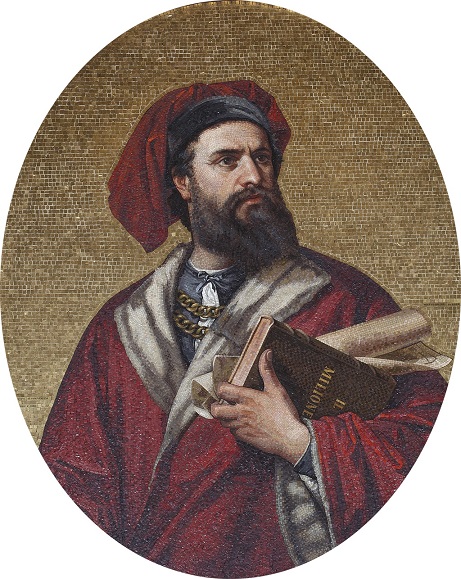Summary | Excerpt | Reviews | Beyond the Book | Read-Alikes | Genres & Themes | Author Bio

This article relates to Invisible Cities
 Although Italo Calvino's Invisible Cities concerns itself with two real people, it is far from historical fiction. The Marco Polo who describes city after fantastical city to Kublai Khan broadly resembles the Venetian merchant and explorer of the 13th century: both traveled the Eastern world and (allegedly, in the real Polo's case) served in Kublai's court. But Polo's musings on memory, semiotics, and desire, not to mention the erudite, poetic language he uses in Invisible Cities, are all Calvino's invention.
Although Italo Calvino's Invisible Cities concerns itself with two real people, it is far from historical fiction. The Marco Polo who describes city after fantastical city to Kublai Khan broadly resembles the Venetian merchant and explorer of the 13th century: both traveled the Eastern world and (allegedly, in the real Polo's case) served in Kublai's court. But Polo's musings on memory, semiotics, and desire, not to mention the erudite, poetic language he uses in Invisible Cities, are all Calvino's invention.
In fact, the real Marco Polo didn't actually write The Travels of Marco Polo, the travelogue that made him immortal. After his return from Asia, where he spent 17 years traveling and peddling his wares, Polo joined the Venetian army in its war against Genoa. He was captured and remanded to a Genoese prison, where one of his fellow inmates, a writer by the wonderfully Italian name of Rustichello da Pisa, was intrigued by the many yarns Polo spun of his travels. Da Pisa wrote them down as soon as he could, then published them when he left prison. They sold like hotcakes — or their 13th-century Venetian equivalent — and Polo's exotic narratives inspired other explorers, most notably Christopher Columbus.
Questions about the veracity of Polo's stories have persisted ever since Travels was first published, albeit for very different reasons. There are some elements that might appear laughably exaggerated to modern readers: an encounter with the mythical Roc, for instance. At the time of their first publication, however, many believed that Polo's accounts weren't exotic or outlandish enough — past explorers had described the Mongols as subhuman barbarians and detailed pygmy nations along the Yangtze River, so Polo's description of a civilization as sophisticated and developed as any in Europe raised eyebrows.
Although there is plenty of scholarly debate on the matter, the broad consensus is that Polo was mostly telling the truth. He may or may not have been an ambassador to Kublai Khan as he claimed, but he almost certainly spent a great deal of time in China; he had specific knowledge of China's monetary system that he couldn't have known otherwise, and Polo's daughter counted a golden passport from the Khan among her father's possessions. While some degree of exoticizing of the East, or "othering," may have been inevitable for a traveler from 13th-century Europe, Polo's accounts generally evince a lack of judgment and a genuine open-mindedness to non-European cultures that was unusual in Western society at the time.
Mosaic of Marco Polo from the Municipal Palace of Genoa, 1867, courtesy of Wikimedia Commons
Filed under People, Eras & Events
![]() This article relates to Invisible Cities.
It first ran in the January 29, 2025
issue of BookBrowse Recommends.
This article relates to Invisible Cities.
It first ran in the January 29, 2025
issue of BookBrowse Recommends.
Your guide toexceptional books
BookBrowse seeks out and recommends the best in contemporary fiction and nonfiction—books that not only engage and entertain but also deepen our understanding of ourselves and the world around us.